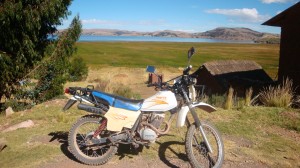
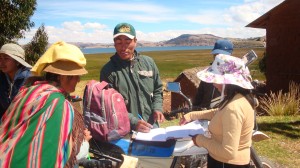
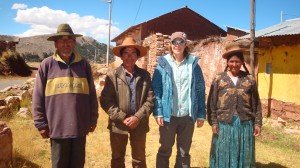
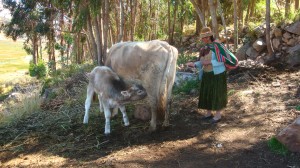
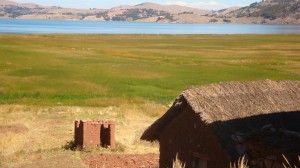 On Tuesday, 14 May 2013, we arrived in Vilquechico which is a district in the Department of Puno. I was accompanied by two managers from JATHA MUHU: Wilmer and Juan, and four undergrad student interns from the University of the Altiplano: Damian, Reynoldo, Vanessa and Melissa. We arrived at 0830 more or less, stored our luggage at the place we were staying, which was with one of the ladies who received a grant of guinea pig. Then we went out to do surveys on the capacity for the guinea pig farmers to enlarge their business and to commercialize it as well as to assess the level of commitment and motivation by the members. At the same time, Jatha Muhu employees were also taking detailed notes on how many and what types of guinea pigs each member had, as well as making sure they were keeping up with their own note-taking on guinea pig numbers in the notebooks they were supplied for each month.
On Tuesday, 14 May 2013, we arrived in Vilquechico which is a district in the Department of Puno. I was accompanied by two managers from JATHA MUHU: Wilmer and Juan, and four undergrad student interns from the University of the Altiplano: Damian, Reynoldo, Vanessa and Melissa. We arrived at 0830 more or less, stored our luggage at the place we were staying, which was with one of the ladies who received a grant of guinea pig. Then we went out to do surveys on the capacity for the guinea pig farmers to enlarge their business and to commercialize it as well as to assess the level of commitment and motivation by the members. At the same time, Jatha Muhu employees were also taking detailed notes on how many and what types of guinea pigs each member had, as well as making sure they were keeping up with their own note-taking on guinea pig numbers in the notebooks they were supplied for each month.
The first woman we spoke to did not want to show us her cages where she keeps her guinea pigs. Possibly because she has not been maintaining them well or keeping them clean. That was the judgement of one of the Jatha Muhu employees. The woman used the excuse that she didn’t have the key to open the galpón where the guinea pigs are kept. The next woman asked if we could come back because she had to get her kids ready for school and milk her cow. We watched her milk her cow, so that was true. Then when she was done, we were ready to move on so we did not register her or administer the survey.
We are right on the edge of Lake Titicaca. In the survey with one of the young women, she said they look at cows as a marketable livestock brining the best price, and everything else is for household consumption, including sheep and guinea pig. They have fields that they tend- both grassy, moist areas along the edge of the lake as well as andenes or terraced fields on the hillsides.
The men get to go to school longer so they have more education. Also this means that they are the ones filling out the guinea pig forms that JATHA MUHU requires and by default they are the ones running the business. I suggested to JATHA MUHU that since this program is supposed to be about self-sufficiency for women, and most women are illiterate and don’t even know how to hold a pen- why don’t they create a form that is easier for women to fill out- perhaps one that uses symbols and drawings instead of written Spanish. Or what about Aymara? Also, along the lines of what Clark Erickson did with the camellones or waru waru in central Peru- creating a picture book with a few words in Aymara/Quechua to demonstrate to the locals why it was in their interests to renew their work on reconstructing waru waru. This could help the program go far. This should also be the focus of operationalizing the approach of ecosystem services.
Right now, ecosystem services is too intellectual an approach in order for it to have any tactical or ground level legitimacy with the people. I found that what I thought were basic ecosystem or environmental questions were actually too complex for the campesinos. Also, Vanessa had the idea that because a lot of kids are leaving to go to other parts, like Lima, to find jobs, that some type of management or leadership program needs to be put in place to identify and mentor future community leaders early. The younger generation is more bilingual and also younger girls, up to about teenagers are a lot more talkative and gregarious then their middle aged mothers who are extremely shy and timid about their guinea pig duties. The younger girls are more likely to speak up about their opinions and thoughts. Melissa and Vanessa, Peruvian student interns also said that these women forget what they learn the previous month about the management of cuy raising because they lack education. I might need a translator! But alas, I changed the questions to be more simple and directly related to their daily activities and this brought out a lot more from my interviewees. Vanessa helped me with suggestions for new questions that would help me elicit better answers for my research.
She said that I should ask about mining because that is a huge contaminator of the lake. She also suggested maybe if I did a survey, that might work better. Also she suggested that I ask about nature, water, plants, trees, earth and air- the basic components that predominate campesino life here or anywhere. She also said that I should ask about their chacra or their plot of land where they plant because this is the essence of their existence. They are self-sufficient farmers, surviving mostly off of what comes out of these cultivated fields and the little meat they are able to raise.
My overall observation is that when these people think about conservation they think about it in terms of agriculture because this is their way of life. So when you ask them about sustainability and food and water security, they talk about irrigation, which they want but don’t have, letting their fields rest for three years, and not using chemical fertilizers, and rotating their crops. But they also have a hard time planning ahead. The rainy and dry seasons, as well as times of flooding around the lake are becoming longer, stronger, and more unpredictable. For this reason, they feel they can’t really have a mitigation plan for these different periods of time.
They also feel isolated and marginalized from the local, municipal and national government. They say that what they have done to combat this climatic risk and risk of unsustainability is to ask for help. But they have not received much more than tools for the field. But I think they would prefer not to have to ask for help-except maybe for irrigation. They all have to bring their animals to the lake to water them too which is a huge chore and why you see men and women going to and fro in town with their livestock in tow.
Eucalyptus are predominant here too, but they are not endogamous and so I don’t know if they do something different to the environment. News flash, Vanessa just told me that they require a lot of water and they also kill the earth as their roots spread far and wide. But one farmer commented to me that they only grow them on the hills where they are not relying on water for their chacras and they are good for firewood for cooking. Some people also cut eucalyptus wood to sell at the market in Huancane.
15 May 2013
Many here, although they practice syncretic religion don{t believe as much in the Pachamama. Some of the older ones, in their 70s, say that their grandparents paid thanks and respect to Pachamama more than they do. But they still believe that they have to take care of their earth and believe that they already do this, as farmers, it is part of their job. But at the same time, there is trash everywhere. They also feel that the government at all levels doesn’t help. Vanessa told me that what happens is when someone is elected alcalde, every four years, of a district, for instance Vilquechico, that they leave all of their campaign promises behind and devote their resources and energy to their own part of the district. They try to fill their own coffers. If they do bring in a project to another village, they promise high quality materials but instead deliver with low quality materials. At its essence this is both nepotism and corruption.
The Aymara people in this district raise sheep, cows, pigs, chickens and now guinea pigs. They understand the direct connection between water, fodder, plants and animals. They can and do communicate this connection themselves. They often mention the saying, “Agua es Vida.” Or “Water is Life.” This is also written on a prominent reservoir on a hill behind Vilquechico’s main plaza and municipal building. But they don’t carry out or don’t know what to do about planning ahead for extra dry or extra wet periods of time. It is too unpredictable these days, they indicate. Also, one farmer showed us that his broad beans didn’t get a chance to mature so they had to use the whole crop for animal fodder. He claimed they didn’t mature because it got too cold too soon this winter. He’s talking about right now because they are harvesting almost everything right now. The guy who said this had a cow and an Aymara wife who only spoke Aymara.
At the reunion on 15 May, in Inkakolla, I realized everyone is a self-sufficient farmer, but they would also like to be able to make extra money by selling their agricultural products at the market. Most kids have gone to the city for work. The farmers have a rationale and they are very rational. They stopped using fertilizer because it encourages the growth of worms and it also kills the earth. But they still think eucalyptus is good and that cow dung is good because they use it for fuel.
We returned early on 16 May because there was only one motorcycle to transport 6 people. Melissa and I got permission to return to Puno by colectivo.
